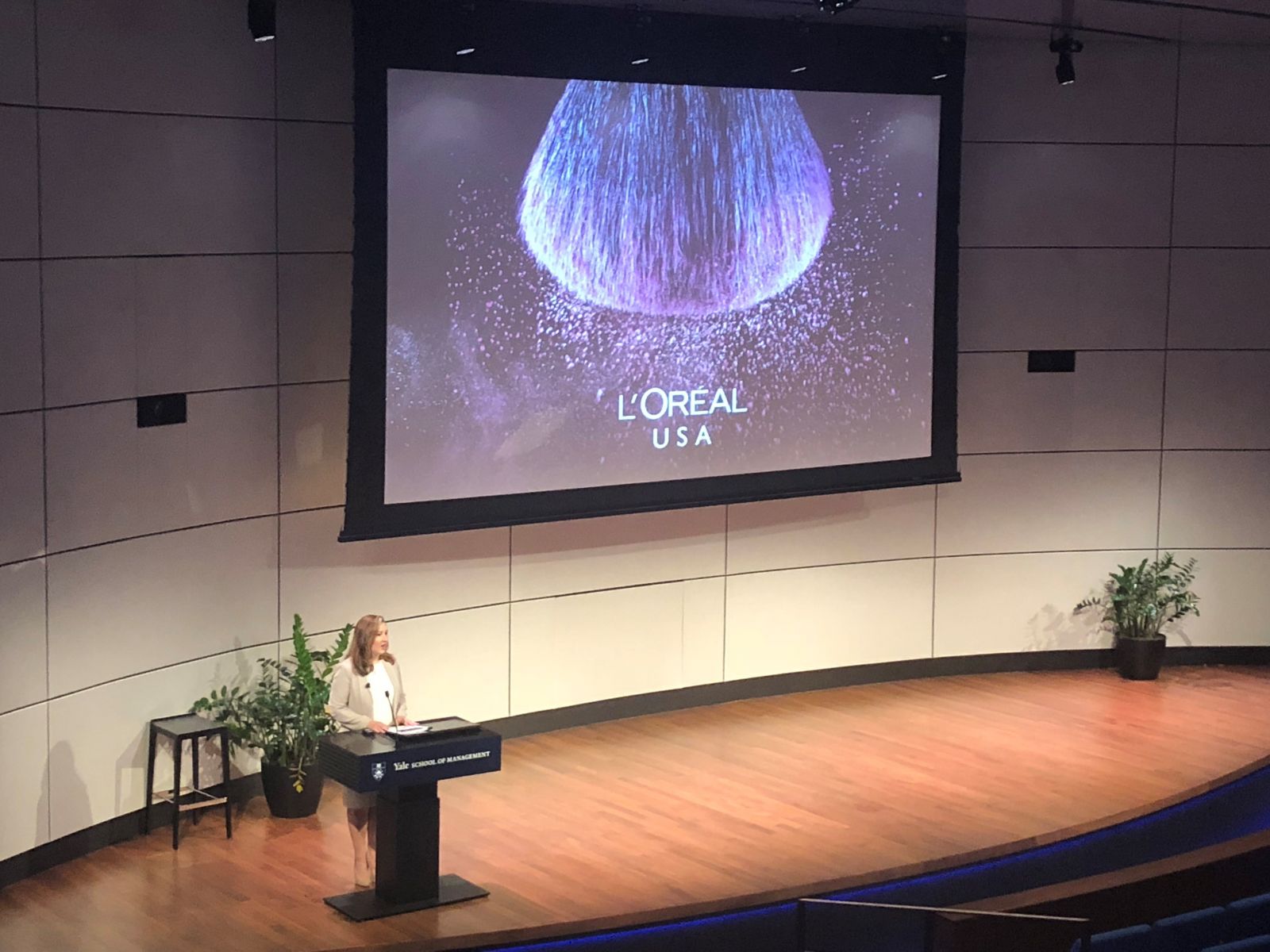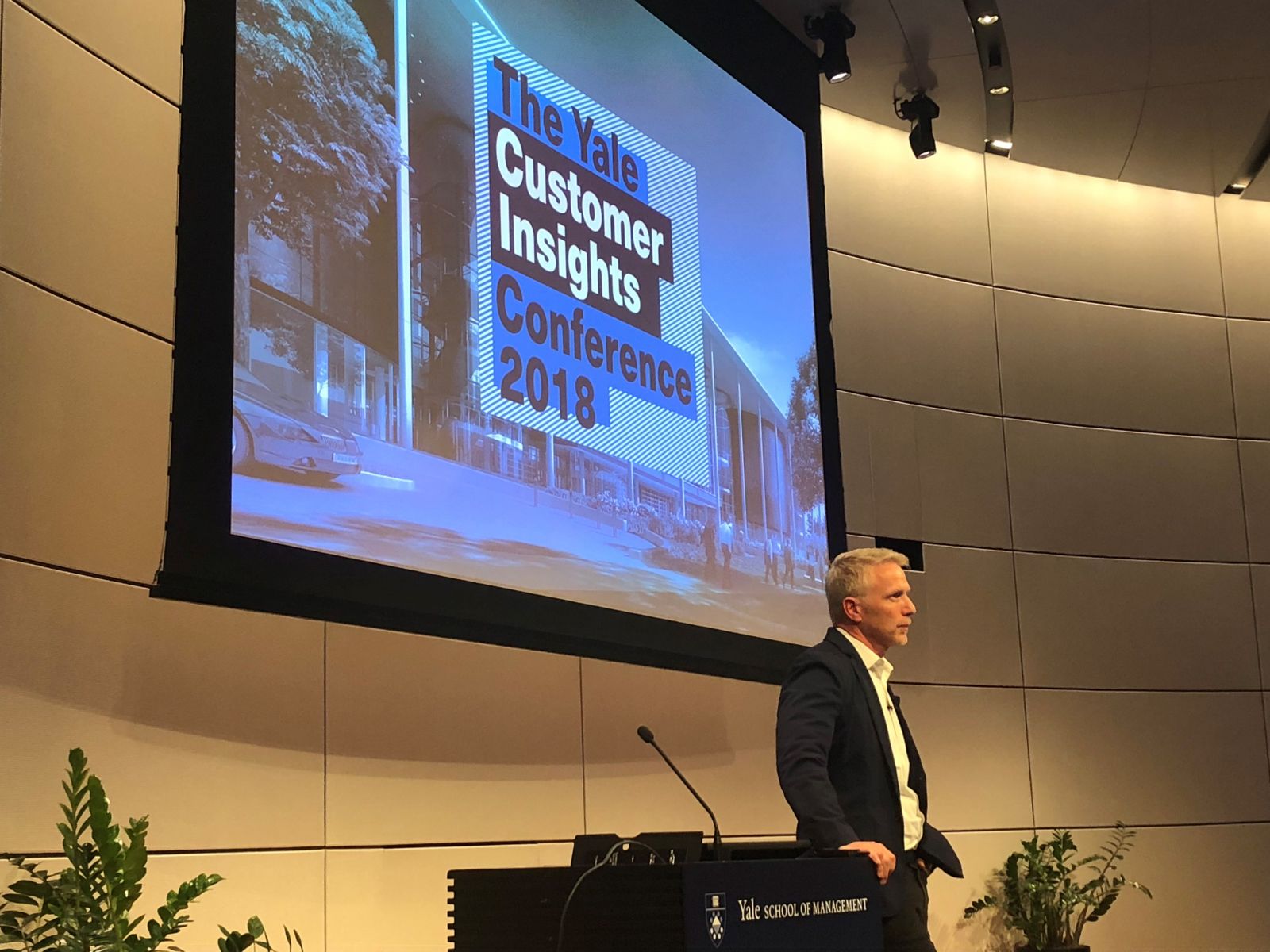
6 Takeaways from the 2018 Yale Customer Insights Conference
OFFICIAL CONFERENCE SUMMARY PRESENTED BY:

Editorial Partner of the Yale Customer Insights Conference
Bold visions from some of the top brands in CPG, tech, social media, and academia were exchanged at the thirteenth annual Yale Customer Insights Conference. Though a wide range of industries and functions were represented on stage, a common message rang through: always keep the customer at the core.

In a data-driven market, customer centricity is critical
Driven by pathbreaking technological developments, leading brands are increasingly personalizing the customer experience to stay relevant and keep their customers loyal. “Consumers always need a seat at the table,” said Brigitte King, Chief Consumer Officer at L’Oréal, noting that marketing to today’s consumer is harder than ever and the growth of digital media has forced retailers to reinvent their brands.
“The biggest difference between product and consumer is that consumers have a memory.” Repetition and retention are key, and customer is a major focus of L’Oréal’s data-driven marketing strategy, which aims to close the loop in insights and measure the consumer’s complex journey while staying relevant in the full circle consumer experience.
Deep insights come from real human interactions in real environments

The need for marketing to reflect the diversity of the customer is crucial, and for HP, reinvention is vital to maintaining relevance in today’s fast-changing world. Dan Salzman, HP’s Global Head of Analytics, & Insights, shared HP’s experimental approach to improving its understanding of its customer segments to make sure it’s re-invention is relevant for all its customers.
Seeking to understand the growing divisions in today’s political climate, HP undertook an ambitious social listening initiative to map the political divide, identifying two major tribes; one views re-invention as “the way we were”, the other as “a better tomorrow.” HP invited a mixed group to meet in person and debate the issues. Through the argument, the groups also identified many issues on which they agree—from concern over the growing political divide to the value of a quality education. And HP believes that these shared concerns are the key to unifying its customers. “If we never reach out, we’ll never come together.”
Data analytics offers powerful tools for predicting consumer behavior
For decades, marketers have relied on insights from psychological research to tackle customer-related business challenges. But Max Shron, Warby Parker’s Head of Data Science, challenged the traditional psychology-driven approach to consumer understanding, explaining that psychological insights are not always needed to predict consumer behavior. In many cases, it makes more sense to throw out the need to understand consumer psychology and move directly to creating models to predict behavior. But Shron believes that consumer psychology still plays an important role: “these [data-driven] approaches complement more traditional psychological approaches and suggest a new hybrid way for businesses to make informed decisions.”
PepsiCo, too, is revolutionizing the future of its insights functionality with an end-to-end “digitalization” of its insights tools, processes, and organization. Chief Insights and Analytics Officer Stephan Gans explained how an investment in a new insights technology platform allows the global function to act faster, smarter, and more efficiently. The move toward a digital global end-to-end insights platform will enable insights solutions across innovation, brand, and packaging and allow the company to make critical changes in effectiveness and efficiency across the brand.
Delivering the right message at the right time is fundamental to brand success

Building one-on-one relationships with consumers is key to achieving resonance in today’s increasingly digital world, and authentically nurturing those relationships is essential to earning customer trust when launching a new brand. Gina Boswell, Unilever’s President of Customer Development shared Baby Dove’s journey to becoming the #3 personal care baby brand in the U.S., which was driven by listening to the concerns of real women. Boswell shared how providing information and allaying fears of first-time expectant mothers helped form lifetime bonds and loyalty to the Dove brand. Dove’s #RealMoms campaign reinforced that there is no single right way to be a mother. And by seeking to inspire confidence in new and expectant mothers, this campaign helped win the trust and loyalty of new customers in a new category. Boswell concluded: “there has never been a more important time to empower woman than the present.”
Female empowerment is also at the heart of Keds’ efforts to modernize its 102-year-old brand while staying true to its roots by championing women to be who they want to be and go where they want to go. Chief Marketing Officer Emily Culp discussed some of the key insights around Keds’ #LadiesFirst campaign: “we know that female empowerment is resonating. The fourth-most clicked area on our website is the hashtag #LadiesFirst.”
By closely examining the digital footprint customers leave on Keds’ online channels, the company gleaned powerful insights about what is important to its customers. “What you can see in a day in her life is three key trends; first, she’s always on her phone, second, she’s constantly multi-tasking, and third, she’s heavily influenced by celebrities and bloggers.” But beyond expanding mobile content and forming partnerships with celebrity influencers, Keds’ focus on female empowerment is central to connecting with its target customer. “We’ll continue to own female empowerment. I think we know that both from our insights and also the reaction from our consumer feedback.”
There is vast, untapped potential in mobile marketing
Mobile purchases now make up almost 40% of all transactions, but most companies still under-invest in mobile because they don’t have the right resources to support it, according to NYU Stern School of Business professor Anindya Ghose. “If you compare the time people are spending on their smartphones versus the ratio of ad dollars being spend on smartphones as a function of ad dollars being spent on print, TV, internet and radio, there’s at least a 7-10% gap there, which in the U.S. alone works out to be about $16 billion in potential monetization that has not been done.” Ghose argues that it is important to identify the known and unknown needs of the customer; location-based targeting doesn’t address consumer-based data and shifts in user behavior. New, precise data coming from mobile users can help fill this gap by supplementing traditional datapoints with additional context including crowdedness, weather, trajectory, and even social dynamics.
The Alibaba Group has no shortage of customer data, which it leverages for incredibly precise mobile targeting and customized user experiences. Lee McCabe, VP and General Manager of Alibaba North America, explained the competitive advantage of Alibaba’s fully integrated media and retail ecosystem where all divisions talk to each other and share data. Bringing together virtual reality, gaming, social media, and retail, provides Alibaba access to a treasure trove of customer data, which, when combined with A.I. and machine-learning tools, enables it to streamline customer service, enhance page personalization, and even support A/B testing further up its supply chain.

E-commerce continues to disruption of retail, and there’s no end in sight
What separates successful retailers like Amazon, Walmart, and Sephora, in the digital age? Barbara Kahn, Professor of Marketing at Wharton argued that it takes more than low price alone. Drawing on her Kahn Retailing Success Matrix, she identified four key areas where retailers derive competitive advantage: brand, frictionless, low price, and experience. Kahn argues that to achieve “superior competitive advantage”, retailers must be the best in at least two of the categories, while providing fair value in the other categories.
Kahn contends that her matrix helps explain the disruption of the retail market by dominant eCommerce players like Amazon. “[Amazon] started out in frictionless. Now they just keep raising the bar so everybody else in the industry is chasing after what Amazon is doing in this category.”
This year’s Yale Customer Insights Conference proved that innovation is transforming the digital space at lightning speed and understanding how consumers think and predicting their behavior is more critical than ever. Bringing together industry leaders from top brands across the globe with the brightest minds in academia, the 2018 Yale Customer Insights Conference provided new ideas and perspectives on rewriting the insights approach for the new digital age.
Over Friday and Saturday, a total of 19 speakers took the stage, advancing frontier perspectives from academia and professional experience, from global and national companies. For a full list of speakers, see below. And please join us for next year’s conference, May 10-11, 2019.
FRIDAY SPEAKERS:
- Brigitte King, Chief Consumer Officer at L’OREAL
- Emily Culp, Chief Marketing Officer at KEDS
- Anindya Ghose, Professor at NYU-STERN SCHOOL OF BUSINESS
- Lee McCabe, VP and GM of North America at ALIBABA
- John Bargh, Professor at YALE UNIVERISTY
- Max Shron, Head of Data Science at WARBY PARKER
- Gina Boswell ‘89, President, Customer Development at UNILEVER
- Tanya Berman, Vice President of Chocolate Category at MARS
- Stephan Gans, Chief Insights and Analytics Officer at PEPSICO
- Eric Solomon, Global Head of Business Marketing at INSTAGRAM
- Dan Salzman, Global Head of Media, Analytics, and Insights at HP
- Barbara Kahn, Professor at WHARTON
SATURDAY SPEAKERS:/h4>
- Stephen Anderson, Assistant Professor at STANFORD GRADUATE SCHOOL OF BUSINESS
- Aparna Labroo, Professor at KELLOGG SCHOOL OF MANAGEMENT
- Elanor Williams, Assistant Professor at INDIANA UNIVERSITY
- Emily Garbinsky, Assistant Professor at NOTRE DAME
- Doug Chung, Associate Professor at HARVARD BUSINESS SCHOOL
- Song Yao, Associate Professor at UNIVERSITY OF MINNESOTA
- Rajiv Garg, Assistant Professor at UNIVERSITY OF TEXAS AT AUSTIN
